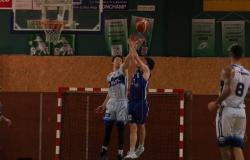The Remparts play in Quebec City, where Laval University is located. Phoenix players who want to pursue higher education have the University of Sherbrooke in their city. The Université du Québec network has locations in Saguenay, Gatineau, Rimouski and Rouyn.
Published yesterday at 6:56 p.m.
The problem: players from the Remparts, Saguenéens, Olympiques, Océanic and other hockey markets named above who would like to continue practicing their sport while studying are pretty much condemned to exile.
The Université du Québec à Trois-Rivières is the only French-speaking institution in the province to have a first-division hockey program. Other options are to study outside Quebec (in Moncton or Ottawa) or to enroll in English at McGill or Concordia.
That’s why, when he took office, QMJHL Commissioner Mario Cecchini advocated for the importance of “supervision from 16 to 24 years old” for young hockey players. For now, once the junior career is over, at 20 years old, the options are limited.
“It’s nonsense that in Canada, we don’t have a well-developed university circuit,” thundered Cecchini, during the press conference that marked the launch of the 2024-2025 QMJHL season, in a Montreal hotel. I don’t blame anyone, everyone is working hard. Right now, we’re pushing in that direction.”
Behind the scenes, players are mobilizing; former Canadiens general manager Serge Savard and former Quebec Remparts owner Jacques Tanguay are among the biggest names involved. And Cecchini wants the QMJHL to be in the picture as well.
“We told the ministry [de l’Éducation, responsable des sports]at the RSEQ [Réseau du sport étudiant du Québec] that we are there, that we are ready to collaborate, that we have the infrastructure. If we are called upon, we will be there. How much do we care about it? It is very important to have a place where our young people can continue to play,” Cecchini continued.
A change seen in a positive light
Speaking of college, Cecchini is excited about possible upcoming NCAA rule changes.
Currently, any player who plays in one of the three Canadian major junior hockey leagues (QMJHL, OHL and WHL) automatically loses his eligibility for the NCAA. Young people who are thinking of going through the American university network must therefore go into exile at a young age; this is what Sacha Boisvert did, for example, who went to study in Rhode Island at age 14. This year, at age 18, he was admitted to the University of North Dakota.
For several months, there has been talk that the NCAA would change its rules so that players from all three leagues could still play in the American university network. However, nothing has been announced yet.
“We don’t have conversations with the NCAA. They make their rules as they see fit,” Cecchini said. “We’re looking at the consequences it would have here. We see it as very positive, but we don’t have the details. Our 16-, 17-year-olds would no longer have to make a choice at that age. Then, we’ll see how the rules are written.”
When the prosecutor arrives
At a time when junior hockey is going through years of turmoil, in the wake of various sex scandals involving players in the Canadian leagues, Cecchini was proud of the “introduction days” that have just been held with the QMJHL recruits.
These days consist of conferences given by different speakers, in order to raise awareness among young people about different problematic issues.
“Consent, sexual harassment… When we talked about consent, I think adults learned things,” Cecchini said. According to the league, 99 players attended the game in Moncton, and 44 others attended the one in Trois-Rivières.
The commissioner recalled that a prosecutor and a sexologist also spoke to the recruits. “The prosecutor came to tell them: you’re not going to get away with this. It’s not because you’re a hockey player that you’re above the law. The young people went out knowing what to expect.”





